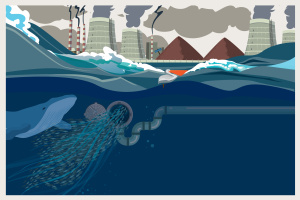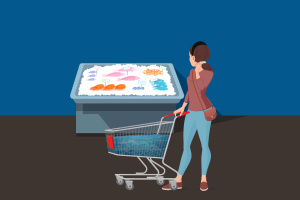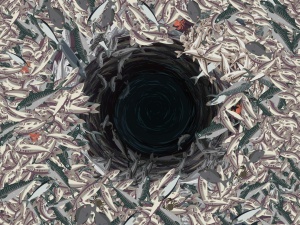Floundering Around: An assessment of where European retailers stand on the sourcing of farmed fish

Executive summary
This report offers an overview of the positions of Europe’s largest supermarket chains on the sustainable sourcing of farmed fish, which is a key issue for the global food retail sector. It sets out to identify leaders and laggards according to their policies and practices in three priority areas:
- The phase-out of wild-caught fish in aquaculture feed
- Monitoring of mortalities on fish farms and blacklisting of producers with excessive mortality rates
- Transparency in aquaculture supply chains and product labelling.
Our findings are based on a comparative review of six scorecards covering 33 major European food retailers which were published by the Changing Markets Foundation and partners between March 2020 and May 2021. We have supplemented these with information gathered through correspondence with the same retailers between June and August 2021 in order to offer a comprehensive and up-to-date analysis of how the sector is positioned on this critical topic.
The global aquaculture industry has experienced staggering growth over the past five decades, going from supplying a mere 5% of fish 40 years ago1 to accounting for over half of the fish we eat in 2021, and this has come with significant environmental and social costs. Not only does the industry impact on marine biodiversity – most notably through the annual extraction of millions of tonnes of pelagic fishA from ocean food webs for use in aquafeed – but it also leaves communities in West Africa, Latin America and other areas in the Global South without essential protein and with impaired access to traditional livelihoods. In addition to this, there are growing concerns about the impact of intensive fish rearing itself on the welfare of farmed fish and cleaner fish,B which die prematurely in their millions every year as a result of poor farming practices.
Aquaculture does have the potential to help relieve the burden on our oceans – if implemented sustainably. In order for it to fulfil this potential, the decoupling of aquaculture and fisheries is of central importance. Sustainable solutions already exist; they include alternative aquaculture feeds and the cultivation of species that do not require feed or that require fewer inputs. Greater transparency is also key to improving the aquaculture industry’s ecological footprint.
The aquaculture industry offers very little transparency regarding its production practices and routinely deflects attempts to draw attention to its murky underbelly: corporate reports and marketing materials highlight the sector’s low-carbon credentials, talking up its potential to relieve pressure on fish stocks in the wild and feed a growing global population with healthy protein. However, a significant body of scientific research and evidence from numerous investigations on the ground (including our own) indicate that, all too frequently, the reality does not match up to companies’ claims.
Citizens and civil society organisations in fish farming countries and regions which supply wild fish for aquafeed have spent years campaigning to raise awareness of the damaging impacts of the global aquaculture industry. However, their calls for greater accountability and transparency in the sector have largely gone unheeded. Instead, powerful multinational companies have been given free rein to expand production without being required to adopt any of the responsible social and environmental practices that would be commensurate with such growth. Negative externalities such as pollution from fish farms and fishmeal factories, decreased food security and damaged livelihoods have been kept off companies’ balance sheets, with the true cost of seafood farming foisted on society at large — more often than not, on communities that already live a precarious existence. For example, research published by Just Economics in February 2021 estimated that salmon aquaculture has produced private and external costs of US$47 billion since 2013, with around 60% falling to producers and 40% to wider society. And in June 2021, a report by Greenpeace Africa and Changing Markets found that, each year, over half a million tonnes of fish taken from West African waters – which could feed over 33 million people in the region – are instead being converted to fishmeal and fish oil (FMFO) in order to feed farmed fish and mostly in Europe and Asia.
A 2018 Eurobarometer survey showed that most EU citizens – 77% – buy fish from either a grocery store, supermarket or hypermarket. The total turnover of all European food retailers in 2018 was €3.5 trillion. With their enormous financial heft and role as intermediaries between aquaculture producers and the public, supermarkets are arguably among the most powerful players in the market. They are the arbiters of standards for food production throughout their supply chains; as such, they bear a critical responsibility to hold their suppliers to account. Shoppers are increasingly aware of this: polling by market research firm Mintel in 2021 found that 23% of consumers see retailers (e.g. supermarkets and online retailers) as ‘most responsible’ for protecting the environment.
And yet, our analysis shows that, as farmed fish and seafood products begin to outnumber wild-caught species on supermarket shelves across Europe, European retailers are failing to perform adequate due diligence on their farmed fish and seafood supply chains.
PARTNERS







You might also like...

What Lies Beneath: Uncovering the truth about Peru’s colossal fishmeal and fish oil industry
This report calls for a rapid phase-out of the use of wild-caught fish to feed farmed fish and other farmed animals.

Atrapados: Cómo los supermercados españoles abordan el empleo de pescado salvaje en su cadena de suministro acuícola
This report looks at how effectively Spanish supermarkets are safeguarding the health of the oceans, through the sustainability of their farmed fish supply chains. Read our Spanish language report:

Fishing for Catastrophe
This report presents damning evidence that the production of fishmeal and fish oil for use in the growing global aquaculture industry is destroying fish stocks, marine ecosystems and traditional livelihoods.